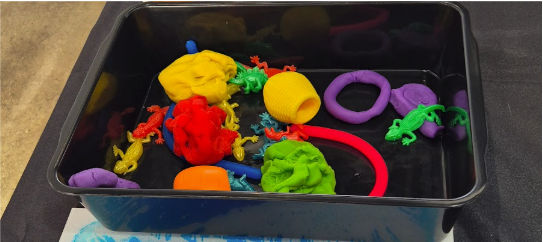.jpg)
At first glance, sensory play might look simple; exploring textures, playing with sounds, or engaging in movement-based activities.
But here’s the thing — for neurodivergent individuals, sensory play is far more than fun.
It’s a powerful tool for connection, regulation, and wellbeing.
At Southern Light Respite in Tasmania, we see every day how sensory activities support people with autism, ADHD, sensory processing differences, and other diverse needs.
And guess what? By intentionally incorporating sensory play into our short-term accommodation (STA) and respite care services, we create opportunities for individuals to feel calm, confident, and engaged in the world around them.
Sensory play involves activities that stimulate the senses such as touch, sight, sound, smell, taste, movement, and balance. These activities are designed to help individuals in developing skills for emotional regulation, social interactions, fine motor skills, cognitive functions like problem solving and memory.
Southern Light Respite has a mix of sensory items, from puzzles, to fidget spinners, to various squishy textured toys, weighted balls, playdoh, liquid play, bubble and gels toys.
.jpg)
So, why does this matter?
For neurodivergent individuals, sensory experiences aren’t always processed in the same way as neurotypical peers. This can make everyday environments overwhelming — or, at times, under-stimulating.
The good news is sensory play helps balance these experiences, providing the input the body and brain need to feel regulated.
Sensory play supports:
See the difference? It’s not just play — it’s purposeful, empowering, and transformative.
Now, here’s something many people don’t realise…
While sensory play is often associated with children, it has incredible benefits for adults as well.
For people living with disability, mental health challenges, or neurodivergence, sensory activities provide both comfort and empowerment.
The benefits of respite care that includes sensory play include:
This is why sensory play is such an important part of respite in addressing individual needs. It goes beyond entertainment — it’s about building skills, promoting regulation, and improving quality of life.
And here’s where it gets interesting…
When participants access Respite and STA providers who incorporate sensory play, they experience not only the joy of engaging activities but also the therapeutic outcomes that align with their NDIS goals.

At Southern Light Respite, we design our programs with a strong focus on individual needs. No two people are alike, and that’s why sensory play looks different for everyone.
Some may enjoy movement-based activities like outdoor play, yoga, or bike riding, while others find comfort in quieter, tactile experiences like arts, crafts, board games or fidget tools.
And here’s the best part — as part of our STA and respite care services, we make sure each individual has opportunities to explore sensory activities in ways that feel safe, supportive, and enjoyable.
Whether it’s helping someone build confidence, offering calm during challenging moments, or simply creating space for joy, sensory play is woven into the care we provide.
But it’s not just about participants.We know that families and carers also benefit when sensory play is prioritised. Seeing a loved one calm, regulated, and thriving can relieve stress and create more positive moments together. As a result, sensory play not only supports the individual but also strengthens the wellbeing of the whole family network.

Sensory play is a powerful, evidence-based approach that helps neurodivergent individuals feel more connected, capable, and calm. From children exploring new textures to adults finding stress relief, sensory activities offer benefits at every stage of life.
At Southern Light Respite, we’re proud to include sensory play in our programs, tailoring experiences to the unique needs of every individual. It’s one of the many ways we create an environment of dignity, connection, and trust — values at the heart of everything we do.
If you’d like to learn more about our respite care, or short-term accommodation in Tasmania, get in touch with our team today.